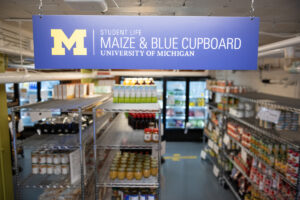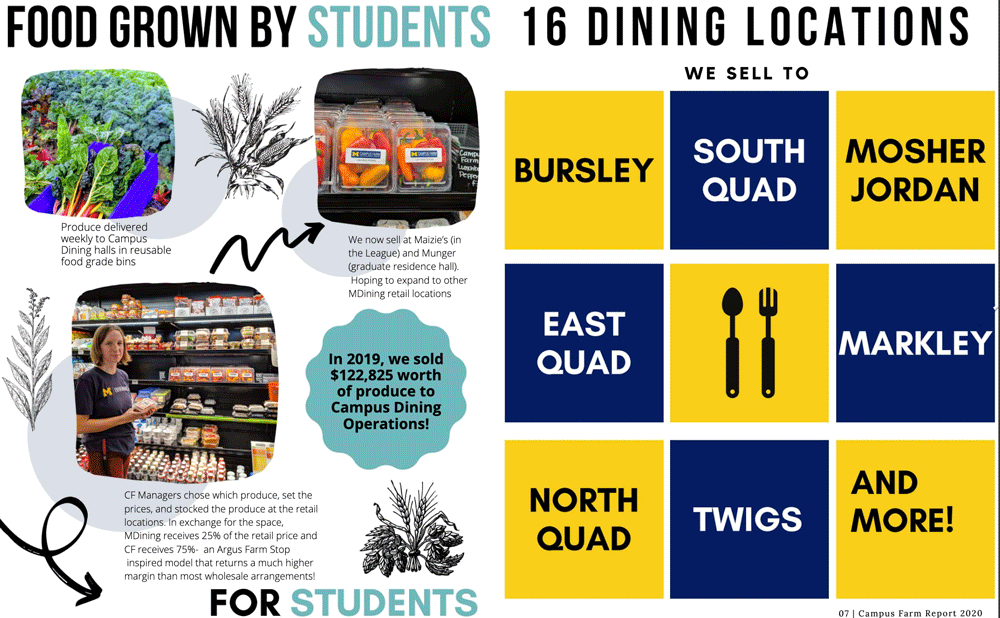An attitude of gratitude
People often make assumptions about University of Michigan students. They are brainiacs. Some say they are arrogant (don’t look at me). A lazy observer would even write them off as privileged and entitled.
But hungry? Or should I say, food insecure?
That one doesn’t appear on the list.
COVID-19 certainly has exposed cracks in our jacked-up American economy. We’ve all seen the lines of cars snaking through parking lots toward food distribution centers. We’ve watched the interviews where college-educated professionals explain they never expected to be in this position.

After years as a roving mobile distribution center, the cupboard established a permanent footprint in Betsy Barbour Residence Hall in 2019. (Photo: Eric Bronson, Michigan Photography.)
Now imagine you’re a Michigan student in 2020 literally broke and unsure of your next meal. Seriously. We’re not talking about the cartoonish “starving student” surviving on ramen and free happy-hour snacks. This is hardcore food insecurity, with enough power to derail one’s education and future success.
COVID didn’t bring food insecurity to U-M. A host of social and economic pitfalls have long conspired to hold back the “not rich” kids, the first-generation students, and the international students who often require more institutional support from U-M than their more-established peers.
As we approach Thanksgiving, a holiday literally designed around a meal, let’s remember these food-insecure students and how hard they aspire to the Michigan ideal under some of the most stressful conditions. Even more important, let’s support the researchers, faculty, staff, and students who are cooking up strategies and solutions to end this problem.
This month, I visited the Maize & Blue Cupboard, a free food pantry in Betsy Barbour. I met and spoke to a number of food justice warriors on campus. I am heartened by their creative thinking and collective ability to develop actionable scholarship while actually putting food in people’s mouths.
I have no assumptions to make. I know these people are simply the best.




THOMAS WITECKI - 1961 and 1963
my roommate in east quad my freshman year was from rural michigan and very poor. he literally spent much more time working in the east quad cafeteria than he did in classrooms, yet was a successful student.
Reply
David Huff - 1963
Great comment. People who choose to help those who are less fortunate should be applauded. But many of my classmates, undergrad and grad, had jobs while they were students. They exercised financial planning and individual responsibility. Learning this is more important than the U-M degree. The fact that “not rich” kids are in U-M means that very substantial support has already been given to them, possibly being admitted when another applicant with equal admission qualifications was not admitted. There are agencies that determine the actual need for help in this area rather than describing it as a need for “more institutional support from U-M.” Describing the situation as the “most stressful conditions” ignores human conditions that one can easily think up without much imagination.
Reply
Jillayne DeYoung - 1978
When I was a student at the U of M in the mid-70’s, I was living on a monthly budget of $12.50 for food and other personal items. I was tall and thin and believe that most people assumed I had an eating disorder. I was literally starving to death. I never thought of myself as “less fortunate” than others and was not receiving “substantial support.” I was very fortunate in spite of my hunger. After all, I was attending a great school, meeting interesting people, President of my school, and learning valuable things that would lead to a very fulfilling, interesting and producitive life, Today, there is much more awareness that hunger is not defined by education, race, geography or class but elitism still rules and there is not enough giving by those who can afford to give,.
Reply
Glenn Michaels - 1986
For some – like my wife and parents – poverty and food insecurity are propellants that lead to professional and financial accomplishment. Such stories are not uncommon in the US. I’m proud of those accomplishments! But it would be foolish to assume that those victories don’t come at a personal cost to those who were motivated. Poverty generates its own form of PTSD, often in conjunction with issues around social, cultural, racial and ethnic disapprobation.
But what about all those other just-as-talented folk who lacked the Horatio Alger gene? Who just couldn’t power past hunger, cultural and financial barriers?
The “losers.”
Stunted opportunity stunts potential. We – the whole world – can’t afford that. We’re only now grasping the importance of energy efficiency; human potential is no less vital in an era of astonishing challenges. Genius resides in all of us. Yet there is none to waste or discard.
America, at its best, is all the proof we need that this is so.
Reply